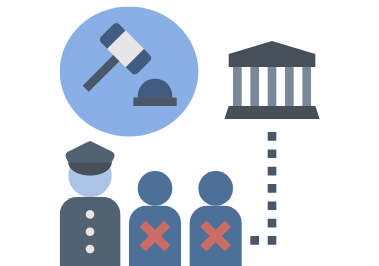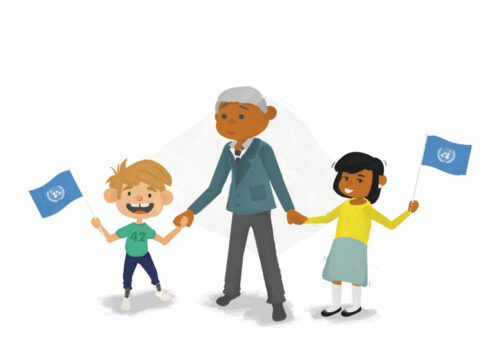
Commissioner Comments on Launch of Raising Minimum Age of Criminal Responsibility (MACR) Consultation
Commissioner Comments on Launch of Raising Minimum Age of Criminal Responsibility (MACR) Consultation
NewsScroll down to find out more about this issue - including a summary for children and young people, background information including the relevant Children's Rights, how we are monitoring Government and our work in addressing the issue.

NICCY was hopeful when with the Northern Ireland Assembly took responsibility for Youth Justice in 2009 that we could see a more child-centred, rights respecting system that would take individual needs of young people that come into conflict with the law in to account.
NICCY would like to see the minimum age that children and young people can be held responsible for a crime to at least 14, but preferably 16. It is important that young people have the opportunity to be supported not to move away from crime and that they are properly reintegrated back in to their communities.
NICCY is supporting PSNI to listen to young people about how they can improve relationships between young people and police so that PSNI are seen first as protection for all, including young people.
More information for children and young people on Youth Justice

In 2015 the Criminal Justice Inspectorate NI, optimistically, found that 59% of the recommendations had been achieved. Tracing the Review, 2021 (commissioned by 4 NGOs) clearly outlines the areas where Review recommendations were not progressed and the work still to be done. Whilst some progress has been made the Youth Justice “journey” of the last 11 years reflects a catalogue of missed opportunities and half-hearted efforts.
A child rights system requires the State to see the whole child, taking a tailored approach in a manner that recognises and responds to their individual needs. The work undertaken across many agencies in NI has raised awareness of the impact of childhood trauma on children, young people and their families. Embedding knowledge of Adverse Childhood Experiences (ACES) across the system should inform how strategic decisions are made with regards to all children and young people including those in the justice system. Such an approach is more likely to reduce offending and re-offending by children and requires a further move away from viewing them through the prism of victim and offender.
In 2020/21 the Youth Justice Agency worked with 1137 young people 160 individual young people were held in Woodlands Juvenile Justice Centre (the custodial centre for children in NI), and there were 1712 referrals (comprising 977 individual young people) to the community-based youth justice services. 78% of all young people involved with the Youth Justice community services and 91% in custody were males.
In March 2022 the Department for Justice published the Strategic Framework for Youth Justice (SFTJ) which sets the strategic direction for the system and specifically the Youth Justice Agency.
 As set out in our legislation, all our work is underpinned by children’s rights, notably the UN Convention on the Rights of the Child, specifically here:
As set out in our legislation, all our work is underpinned by children’s rights, notably the UN Convention on the Rights of the Child, specifically here:
Article 3
Article 16 -Privacy
Article 37
States Parties shall ensure that:
(a) No child shall be subjected to torture or other cruel, inhuman or degrading treatment or punishment. Neither capital punishment nor life imprisonment without possibility of release shall be imposed for offences committed by persons below eighteen years of age;
(b) No child shall be deprived of his or her liberty unlawfully or arbitrarily. The arrest, detention or imprisonment of a child shall be in conformity with the law and shall be used only as a measure of last resort and for the shortest appropriate period of time;
(c) Every child deprived of liberty shall be treated with humanity and respect for the inherent dignity of the human person, and in a manner which takes into account the needs of persons of his or her age. In particular, every child deprived of liberty shall be separated from adults unless it is considered in the child’s best interest not to do so and shall have the right to maintain contact with his or her family through correspondence and visits, save in exceptional circumstances;
(d) Every child deprived of his or her liberty shall have the right to prompt access to legal and other appropriate assistance, as well as the right to challenge the legality of the deprivation of his or her liberty before a court or other competent, independent and impartial authority, and to a prompt decision on any such action.
Article 40 (3) (a)
States Parties shall seek to promote the establishment of laws, procedures, authorities and institutions specifically applicable to children alleged as, accused of, or recognized as having infringed the penal law, and, in particular:
(a) The establishment of a minimum age below which children shall be presumed not to have the capacity to infringe the penal law;
(c) Regularly collect, analyse and publish data relating to the use of stop-and-search checks on children, disaggregated by age, sex, disability, geographic location, ethnic origin and socioeconomic background.
79 (d) Establish the statutory principle that detention should be used as a measure of last resort and for the shortest possible period of time and ensure that detention is not used discriminatorily against certain groups of children;
79 (a) Raise the minimum age of criminal responsibility in accordance with acceptable international standards;
In November 2019 the UN Committee on the Rights of the Child published General Comment 24 on Children’s Rights in the Child Justice System which provides a helpful benchmark to assess the system.
The Justice (NI) Act, 2002 now incorporates Article 3 of the UNCRC as an aim of the NI Youth Justice System. It is welcome that the system is increasingly recognising their obligation to the best interests of children and young people. We await guidance and consistent evidence that this aim is being met by all the relevant agencies.
More than any other agency the PSNI appear to understand their duties to implement the rights of children but fall short in ensuring words are turned into deeds. Every officer must understand how this translates to their routine engagement with children and young people.
Stop and Search
“Those involved in the creation and exercise of stop and search powers should not underestimate the potential for public harm in the event that the powers are used arbitrarily and excessively in respect of minors in terms of the effect it could have on confidence in and support for the PSNI” Belfast, High Court
The use of Stop and Search in relation to young people remains a contentious issue with little progress to demonstrate that the quality of engagement has improved or that such powers are used effectively. NICCY is aware that the PSNI are currently progressing a programme to support their officers in improving practice and improve information to young people and awaits to see if this this yields tangible outcomes.
The decline in the use of Stop and Searches has continued although NI has amongst the highest numbers proportionate to the population when compared to services in England and Wales. PSNI data shows that 11% of stop and search operations involved young people
There has been no discernible progress on the fact that many young people continue to state that they feel “targeted and victimised” through the use of Stop and Search.
Experiences of stop and search shape the views of many young people and their peers and in turn will impact on confidence in the PSNI, if they are victims of crime in the future. There remains little evidence that Stop and Search is an effective policing tool, or that it is undertaken in a way that keeps communities safer or is in the best interests of the child.
Spit and Bite Guards
Following 2 years use as a temporary measure, in June 2022 the PSNI decided to continue the use of Spit and Bite Guards (SBG) (a breathable mesh hood placed over the head and face) as a permanent tactical option including on children and people. Between March 2020 to June 2022 6.4% of all deployments of SPBs involved young people .
There has been strong opposition and concern regarding the use of this method on children and young people including from the Police Ombudsman who stated:
“The use of Spit and Bite Guards on children and young persons should, in my view, be prohibited.”
The PSNI have instructed officers that there will be a presumption that spit and bite guards should not be used against children and young people. Also, as mitigation they plan to improve their training (to include ACEs), all incidents involving young people will be examined by senior officers and all children will be referred to social services to ensure support and aftercare. Additionally, PSNI have committed to:
“continue to scrutinise the use of Spit and Bite Guards on children through a proposed performance accountability framework”.
The presumption that it will not be used on children is too vague and leaves scope for routine use on children and young people. There is a considerable risk that the use of this method will add to young people’s belief that PSNI discriminate against them, treating them unfairly and disrespectfully.
UN General Comment 24 encourages State parties to take note of the scientific evidence concerning child – and specifically brain – development and subsequently adopt a minimum age of criminal responsibility of 14 years of age.
Regardless of all the evidence and rights standards, children are held to be criminally responsible at 10 years of age in Northern Ireland (as well as in England and Wales) which remains the lowest in Europe.
In October, 2022 the Department of Justice launched public consultation on raising MACR. This demonstrates the commitment of DoJ to follow-through on the intention that criminal justice legislation, policies and practice in Northern Ireland are trauma informed and reflect our understanding of ACEs.
Delay
General Comment 24 reminds State Parties that delay to the conclusion of cases runs the risk of losing the desired outcome.
Delay remains one of the most intractable issues in the Youth Justice System and the one that most concerned the YJR group describing the extent of delay in NI as “unconscionable”. They made a clear recommendation that “Statutory Time Limits (STLs) should be introduced for all youth cases, providing a maximum period from arrest to disposal of 120 days” at the next available legislative opportunity. Since this time all opportunities have been squandered with the DoJ preferring to direct their efforts to practice improvements. The latest available statistics indicate that despite these practice changes and significantly less young people going through the youth court, there has been no sustainable improvement. Additionally young people continue to wait longer for the resolution of their cases than adults appearing in Magistrates courts.
Early Intervention and Diversion
Adverse Childhood Experiences manifest themselves differently in children including offending behaviour. However regardless of this family support in a way that does not stigmatise or demonised parents, children or their communities should be the primary response.
However, the Youth Justice Agency intends to continue to increase its “earlier stage interventions” (which includes diversion) at a time when other types of interventions such as Youth Conference plans, community orders and custody decrease. Earlier Stage Interventions represent 20% of the Agency’s referrals although it has to be noted as these are often shorter than other interventions and, therefore, do not represent a fifth of the workload.
An emphasis on early intervention and diversion must be applauded but it is not the best use of YJA resources and expertise. For early intervention and prevention to be effective it must be central to and managed generic children’s social care – specifically multi-disciplinary teams in Health and Social Care, Family Support Hubs and the voluntary and community sectors. Whilst they must be involved it is not the role of DOJ, YJA or PSNI to be the leaders in providing such interventions.
Custody
All children imprisoned in Northern Ireland are accommodated in the Woodlands Juvenile Justice Centre. The last inspection of the JJC in 2022 found that children were held safely and well cared for.
Custody in NI is not a measure of last resort. In 2020-21, 3% young people in the JJC were sentenced, with the remaining 98% either there on PACE or remand. Despite this evidence the DoJ have not been able to progress their intention to address the recommendations regarding bail and PACE of the YJR and the now, non-operational, NI Law Commission. NICCY looks forward to DoJ progressing their intention to lay legislation that reforms bail and custodial sentences for children.
There has still been no progress to address the fact that the proportion of children who identify as Catholic remains the highest of any religion at 59%.
The DoJ and DoH have been working in partnership, since 2017, to reform secure care and custody and develop a shared campus partly in response to the unacceptable high numbers in custody who are cared for by the state. There are merits in these proposals: firstly, Lakewood Secure Children’s home has experienced challenges both in how they care for increasingly vulnerable young people and the nature of the accommodation. Secondly, as outlined above custody the JJC is not being used for the purpose intended but instead primarily to accommodate children who are better served by other services. Since the Criminal Justice Review, 2000, have been a number of programmes and processes to address this issue with little impact.
In March 2022, the proposal had been abandoned with the decision made that the 2 centres would continue to operate separately but they would pursue harmonisation of particular services such as education and health.
A shared facility is not without issues but the pooling of resources across justice and care to achieve a single creative, child-centred solution to children requiring security alongside services that prevent the deprivation of liberty deserves further consideration. NICCY welcomes further developments in shared working in the areas of health and education however this will not fulfil the strategic recommendation made by CJINI in its recent inspection on Woodlands where it stated that at the cost £829,988 per occupant – an untenable situation.
Outcomes and data
General Comment 24 also reminds state parties of the importance of collecting disaggregated data but also undertaking regular evaluations of their services and of course outcomes. It continues to be a challenge for a number criminal justice agencies to report on the difference they have made to the young people and communities that they serve. Instead, they continue to report in some detail on activity and processes. Ensuring effective measurement, reporting and analysing the impact that various activities have on service users is essential for both accountability and effective long-term governance of the youth justice system and its progress.
This has been the subject of some examination by the NI Audit Office who in, the follow up of their 2017 report addressing the value for money of the YJS stated that despite some progress they could not conclude that “that the system delivers value for money”:
It is not an impossible task to publish impact data and indeed the publication by the YJA of a Performance Impact Report (2020/21) is a promising start which has been built upon by the 21/22 report particularly in the area of early intervention and diversion but further work needs to be done to demonstrate that re-offending by children has been prevented.
SOCRNI III Calls to Government:
In 2020 we cited the lack of a NI Assembly and Executive for minimal progress in implementing the 2018 recommendations. Progress remains slow partly due to Covid but mainly to the lack of appetite to accept the possibilities presented by a rights compliant youth justice system not only by elements of the NI Assembly and Executive but by sectoral leaders..

Commissioner Comments on Launch of Raising Minimum Age of Criminal Responsibility (MACR) Consultation
News
An inspection by the Criminal Justice Inspection Northern Ireland finds an improved picture from the…
News
Following the release of the Northern Ireland Audit Office (NIAO) report ‘Managing Children who Offend’,…
News
Increasing the Minimum Age of Criminal Responsibility in Northern Ireland

NICCY provided oral evidence to the Justice Committee on the Justice (Sexual Offences and Trafficking…

NICCY provided advice on the Justice (Sexual Offences and Trafficking Victims) Bill

NICCY provided advice to the consultation by Department of Justice of Court approval of minor…

The Police Service for Northern Ireland is quoted by The Detail, in their investigation in…
Commissioner's Blog